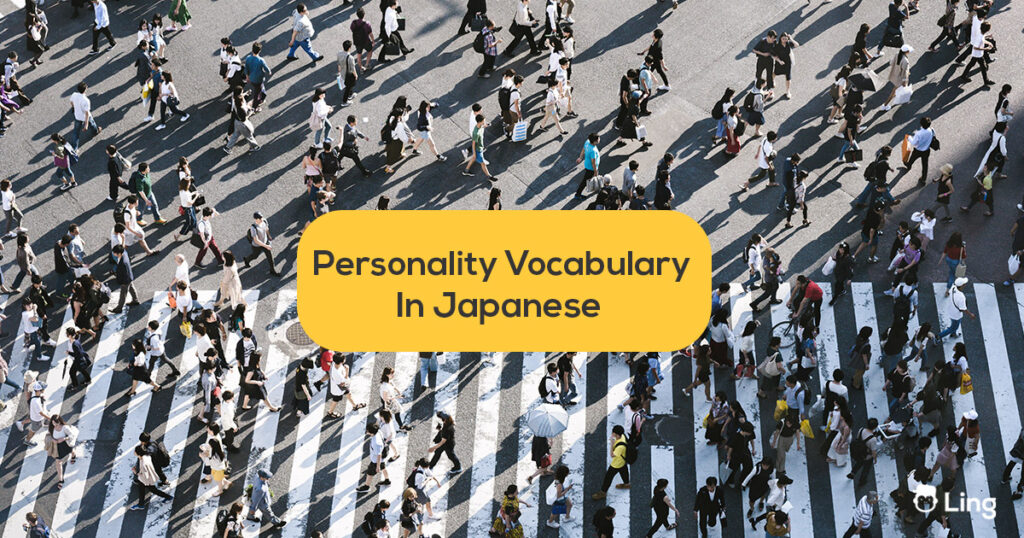How would you describe yourself if someone asked you who you are in Japanese? Are you more of an introvert or an extrovert? If you want to be able to talk about your character, it is essential to master the personality vocabulary in Japanese. Describing your “性格” (seikaku, personality) or someone else’s is a valuable tool to exercise your conversational skills in Japanese.
No matter what setting you are in, personality traits make a great subject for discussion. So we thought this would be an excellent opportunity to introduce you to some descriptive adjectives you may not be familiar with. Once you have mastered them, talking about personality in Japanese will be a walk in the park.
Easy Personality Vocabulary In Japanese
Please take note that the words we’ll be sharing below do not actually have direct translations in English. However, we’ll try our best to explain their usage and provide examples so that you can get a better understanding of them. Let’s start!
1-Majime (真面目)
This is considered a good personality trait. 真面目 means serious or earnest; this term refers to someone who is trustworthy, responsible, and works hard to do the right thing. When someone is 真面目, people might say, 性格がいいですね( seikaku ga ii desu ne), meaning that someone has a good personality.
2-Genki (元気)
You may have heard or even used this word to ask someone how they are doing. The word 元気 means energetic and is used to describe someone with a lot of energy and a good mood/spirit. So when you ask someone お元気ですか? (O genki desu ka?) You are literally asking them if they feel good or energized.
3-Nebaridzuyoi (粘り強い)
This is another personality trait considered very positive among the Japanese. 粘り強い is used to describe someone persistent who doesn’t give up easily. Someone who is stubborn in a good way.
4-Gaikōteki (外向的)
Generally, there is a perception that Japanese people are shy, and while many are, not everyone is the same. The word 外向的 means extrovert and is used to describe outgoing, funny, and talkative people who are usually the life of the party.
5-Naikōteki (内向的)
The term 内向的 is used to describe someone shy. People who prefer to be alone or in small groups. They tend to lack self-confidence, struggle with social skills, and feel ashamed of interacting with others.

6-Kibunya (気分屋)
Have you ever met a person with a changeable mood? Someone who wants one thing now and another thing later? This is a 気分屋 or moody person, someone unpredictable whose thoughts and moods change quickly.
7-Okorippoi (怒りっぽい)
This is considered a bad personality trait among Japanese people. 怒りっぽい is a short-tempered person who gets upset/mad exceptionally quickly and cannot hide it.
8-Sekkyokuteki(積極的)
積極的 means to be proactive. These types of people can take the lead, anticipate possible events that may occur, be responsible for what happens to them, and have the ability to make decisions at every moment under pressure or in adverse conditions.
9-Shinsetsu (親切)
The word 親切 means kind or gentle—people who strive to establish a pleasant atmosphere of trust and mutual understanding in their relationships. The people care for others and desire to exhibit as many of the customs associated with goodwill as possible.
10-Musekinin (無責任)
This is a bad personality trait, and people who possess it are looked down upon in Japanese society. 無責任 means being irresponsible, unable to keep their word, so they cannot be trusted. Generally, when talking about this type of person, it is said that they have a bad personality 性格が悪いです(Seikaku ga waruidesu)。
11-Ijiwaru (意地悪)
A person 意地悪, or mean/unkind, is disrespectful or inconsiderate to others—someone who doesn’t mind being rude to someone else.
12-Kurai (暗い)
Have you ever seen someone walking around with a dark cloud over their head? Someone who is always down has a depressing mood and never seems satisfied with life. If your answer is so, the word 暗い fits that person perfectly, as it means dark or gloomy.
Expressions To Describe Personality
Now that we have learned these descriptive adjectives let’s look at examples of how to use them to describe someone’s personality.
Examples:
1-田中さんはいつも元気ですねー。悲しむ姿も、怒る姿も見たことがありません。
- Tanaka-san wa itsumo genkidesu neー. Kanashimu sugata mo, okoru sugata mo mita koto ga arimasen.
- Tanaka-san is always cheerful, isn’t he? I have never seen him sad or angry.
2-浩太はいつも遅れて、時間通りに仕事を終わらせることはありません。 彼はとても無責任です。
- Kōta wa itsumo okurete, jikandōrini shigoto o owara seru koto wa arimasen. Kare wa totemo musekinindesu.
- Kota is always late and never finishes his work on time. He is very irresponsible.
3-ルイさんと出かけたくないです。彼はいつも土壇場で気が変わります。とっても気分屋です。
- Rui-san to dekaketakunai desu. Kare wa itsumo dotanba de ki ga kawarimasu. Tottemo kibun-yadesu.
- I don’t want to go out with Louis, because he always changes his mind at the last minute. He is too moody.
4- ななさんの性格は本当にいいです。彼女はいつもちゃんとしてますね。真面目なひとです。
- Nana-san no seikaku wa hontōni īdesu. Kanojo wa itsumo chanto shitemasu ne. Majimena hitodesu.
- Nana has a really good personality. She is always well-behaved. She is a serious person.
5-先生の顔が怖いですね。怒りっぽいです。
- Sensei no kao ga kowaidesu ne. Okorippoidesu.
- The teacher’s face is scary. It looks like he is angry.
There you go! Talking about personalities in Japanese is easier than you thought, isn’t it? Now is the time to practice so that you can confidently talk about your personality or someone else’s in Japanese.

Learn More Personality Vocabulary In Japanese With Ling
Would you like to be able to talk about your personality and much more in Japanese?
With the Ling app, learning Japanese is more fun than ever. If you don’t like chunky books and prefer an interactive and dynamic learning experience, we have the perfect solution for you. With Ling, you can make quizzes, listen to audio exercises, complete mini-tests, and so much more. You can use it on its own or as a complement to your Japanese study plan.
Sign up for a free account and discover what so many people can stop learning with ling.
Download it now from the App Store or Play Store and become a Japanese master with ling.



































































